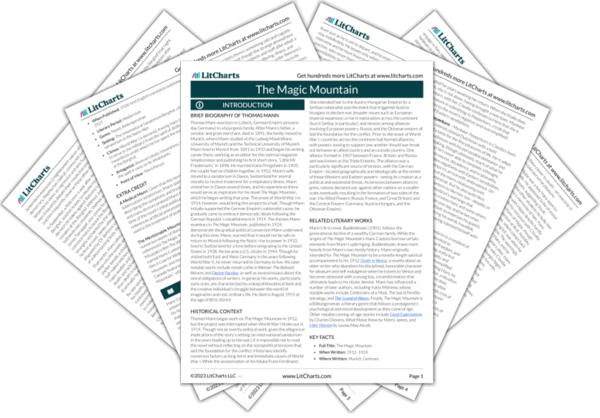Summary
Analysis
Time passes, and eventually it’s October, a fact Hans hears Hermine Kleefeld announce to some of the other residents, noting that this will be her second October at the Berghof. Depressed at having been “cheated out of life,” she demands that Rasmussen, another resident, tell her a joke. Rasmussen knows some jokes but is too tired to tell then. Settembrini, having overheard this exchange too, laughs at Hermine’s complaining—they all love the life of loafing they live here, Settembrini insists. He cautions Hans to be aware of all the irony that flourishes at the sanatorium.
Settembrini calls out Hermine Kleefeld’s irony to warn Hans that Hans, like Hermine, will become aimless and in denial about it if he stays at the Berghof too long. Settembrini’s warning about irony is itself a bit ironic, though, given that Settembrini isn’t exactly setting a great example for Hans despite his claims to the contrary. For all of Settembrini’s advice to leave the Berghof and live a productive life back in the real world, Settembrini doesn’t seem all that motivated to leave the Berghof himself. He is a walking contradiction, preaching rationality yet behaving irrationally.
Themes
Hans is somewhat glad that Settembrini has continued to talk to and teach him, but he’s increasingly resistant to the man’s lessons and doubts the meaningfulness of everything he has to say. Now, he defends Hermine against Settembrini’s criticisms—she’s quite ill, Hans argues, and surely has every right to complain. Settembrini has no patience for “despair,” though—it, and illness, are both forms of “depravity.” Hans can’t accept this—he’s more convinced that illness is caused by depravity or can at least lead to it. All the same, Hans takes in what Settembrini has said—he thinks it’s a bit similar to Krokowski’s ideas about love.
Hans, ever the stubborn youth, continues to disregard Settembrini’s well-intentioned advice. Settembrini’s impatience for “despair” stems from its inherent self-indulgence. As Settembrini sees it, to despair (or rather, to suffer) is to attach meaning and significance to illness or misfortune. It’s irrational to despair and wallow in self-pity over something like illness, over which is which a person has no control. Settembrini considers despair a “depravity” because its passive nature puts it at odds with his humanist ideals of progress and potential.
Themes
Settembrini voices his disapproval of Krokowski. While Settembrini isn’t fully against analysis, he thinks it can be bad when people misuse it. He compares it to enlightenment ideals: it can disprove bad personal biases and liberate people, but it can also “prevent[] action, and damage[] life at its roots.” In this way, concludes Settembrini, analysis is quite like death.
Settembrini condemns psychoanalysis for the same reason he condemns despair: both “prevent[] action, and damage[] life at its roots.” He seems to suggest that psychoanalysis can be a good thing if people use its findings to realize their biases and improve their behavior, but people can also fail to translate these abstract findings about their inner selves into direct action. He also seems to take issue with psychoanalysis’s central claim that humans are fundamentally ill: that they have mysterious, repressed urges that resist rational explanation.
Themes
Hans tells Settembrini about the nodules that Behrens saw on his X-ray the other day. Settembrini says something derogatory about the director, and Hans accuses him of being unfair to Behrens. After all, the man is working to alleviate suffering and help humankind. Settembrini merely chuckles and says it’s time they take their rest cures. Settembrini takes his rest cure with others on the rooftop, and he mentions now that Russian residents—male and female—join him there. Hans, inwardly, wonders if Settembrini knows what’s going on between him and Clavdia, and he gets upset at the older man for being so nosy.
Hans, in emphasizing Behrens’s efforts to alleviate suffering and improve humankind, appeals to Settembrini’s humanist sensibilities. He implies that Settembrini ought to like Behrens, since his work supports values that are important to Settembrini. Hans makes a valid point here, and this exchange also gestures toward one of Settembrini’s flaws: he doesn’t necessarily act on the abstract ideals he believes in. Settembrini, as a humanist, believes that humans should actively work to reach their full potential, and yet he remains at the Berghof, as passive as anyone else.
Themes
Get the entire The Magic Mountain LitChart as a printable PDF.

Hans, still annoyed at Settembrini, returns to his room and writes a letter to his favorite of his uncles, James Tienappel, telling him to inform the consul that Hans will have to stay at the Berghof for longer than expected—perhaps through the winter—and to make arrangements for some of his personal effects to be sent there. As Hans writes the letter, he wonders why he put the task off for so long. After all, it has granted him his “freedom.”
Hans’s realization that confirming his stay at the Berghof has granted him is “freedom” gives insight into his main reason for wanting to remain there. Hans wants to live with the freedom he believes illness gives a person: the freedom to behave poorly and irrationally, behavior he’s observed and envied in Herr Albin first and Clavdia Chauchat later.
Themes












